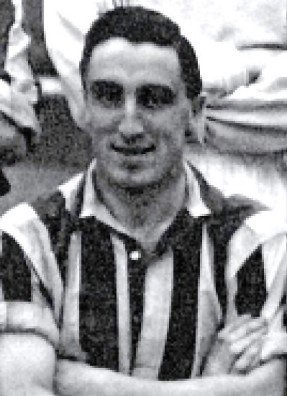Signed from Perthshire side Balbeggie Amateurs on 9th October 1948, twenty-year-old Ian Gardiner established himself in the reserves during season 1948/49 and the first half of season 1949/50 before being handed a starting place in the East Fife team that defeated Raith Rovers 3-0 in front of Bayview’s record attendance of 22,515 on 2nd January 1950. The right-winger kept his place in the side for the following day’s trip to Dumfries, where manager Scot Symon’s faith in the player was rewarded when Ian scored a “spectacular” third goal in an emphatic five-nil victory over Queen of the South. Competition for a regular place in the side was fierce during the early 1950’s, however, and Ian was unable to establish himself at his recognised position of outside-right, with East Fife stalwart Bobby Black firmly established in that position.
When the club eventually replaced Black with future legend Jackie Stewart, signed from Dunfermline Athletic, the decision was made to try Ian at centre-forward, and East Fife’s faith in the player was rewarded when, during season 1951/52, he netted twenty-six competitive goals as the Methil men achieved a final top-flight league position of third. When the player repeated his goal-scoring prowess during the following campaign, the international selectors decided to have a look at the Methil “goal-machine”, and Ian Gardiner was duly selected for the newly-formed Scotland ‘B’ side to face France in Toulouse on Tuesday 11th November 1952. The purpose of the ‘B’ international matches was to give promising players who had the potential to eventually turn out for the full international side experience and games in an international set-up in order to fully assess their abilities. Also included in the party selected to travel to France in November 1952 were future Scotland internationalists Tommy Docherty (Preston North End), Willie Ormond (Hibs), Doug Cowie (Dundee), Jimmy Davidson (Partick Thistle), Ian McMillan (Airdrieonians) and Tom Gemmell (St. Mirren). Please note that the last named player is NOT the former Celtic, Notts Forest and Dundee player of the same name!
With the match being played in almost incessant drizzle, both sides started nervously, but Ian Gardiner nearly broke the deadlock during the opening exchanges when he almost beat French ‘keeper Remetter in a race for the ball. Scotland eventually gained control of the game, and the home ‘keeper was called into action on two further occasions to deny Gardiner. Unfortunately, Ian failed to find the net in what ended up a no-scoring draw, during which Hibs’ Willie Ormond sent a penalty high over the cross-bar during the second half much to the vociferous delight of the 25,000 home crowd! Ian failed to keep his place in the ‘B’ international side for their following fixture against England at Easter Road four months later, but continued to impress in the East Fife side and, on 24th October 1953, scored the opening goal in the League Cup Final victory over Partick Thistle at Hampden as the Methil men won that trophy for a record third time.
Ian Gardiner pulled on the dark blue of Scotland for the second time as an East Fife player when he was selected to play for the Scottish League side to face the Irish League on Wednesday 15th September 1954 at Windsor Park in Belfast. Although the match report which appeared in the following edition of the Dundee Courier claimed that Gardiner “had an unfortunate night”, the East Fife man played a huge part in the build up to the first two goals before heading home the third! Just over a year later, Ian Gardiner signed for Motherwell, and during his time with the Fir Park side the player was finally selected to play for the full Scotland international side; a 1-1 draw with Wales at Hampden in November 1957. As a Motherwell player, he had earlier won a second ‘B’ international cap against England in February 1957. After his Motherwell days were over, Ian returned to Bayview for a second spell following a very brief period with Raith Rovers, but remained at Bayview for less than a season before moving on to St Johnstone and eventually Montrose.
Jim Corstorphine
